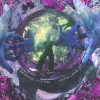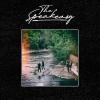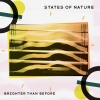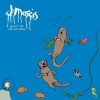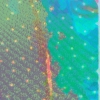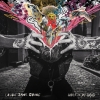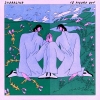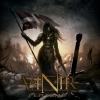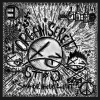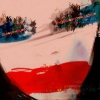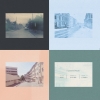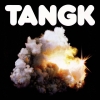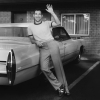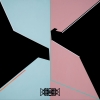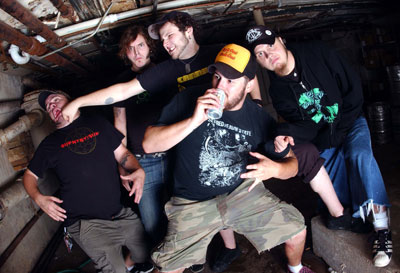
author AP
date 12/12/07
Despite major setbacks in the last few years, The Black Dahlia Murder has consistently plowed the underground fields, building up a loyal, ever-growing fan base for their eclectic blend of death metal, black metal and hardcore. Named after the notorious murder of Elizabeth Short, The Black Dahlia Murder joins the nihilism of old school black metal to the energy of modern hardcore and polishes the alloy with the uncompromising brutality of death metal. This band’s story is an upward one, currently touring with legends The Red Chord and Job For A Cowboy. I caught the band’s bassist, Bart, in Portsmouth’s Wedgewood Rooms to exchange a few words about how it all came to be. Without further a due, I present to you Ryan “Bart” Williams of The Black Dahlia Murder:
RF.net: Hi there, and thanks for doing the interview! For starters, can you please introduce yourself?
Bart: My name is Bart and I play bass for The Black Dahlia Murder.
RF.net: So how are things in The Black Dahlia Murder?
Bart: Great right now. Our new record just came out in September and we're just touring non-stop. We also did the Metal Blade 25th anniversary tour in the States just before this tour. That was with Cannibal Corpse headlining, so that was awesome! Our record's been selling pretty decently and the shows have been really fun. We're just really trying to push "Nocturnal" right now and tour, tour, tour. We're going to take a little time off for Christmas, but other than that, we'll just be on tour, be out there, you know?
RF.net: While you were on tour with Cannibal Corpse, did Corpsegrinder make you play World of Warcraft?
Bart: He didn't! Actually, when we were on Sound of the Underground, I had quite a lengthy discussion with him about it. Because I've played before for a little while, but I had to quit because it's one of those games that if you start playing it, you just can't do anything else. But he still plays it all the time and if you start talking to him about it, he'll just go and go and go on about it.
RF.net: It's all about hate for the Alliance, right?
Bart: Yeah, hate for the alliance, exactly!
RF.net: You're currently on tour with Job For A Cowboy and The Red Chord. How's that working out?
Bart: Awesome. The Red Chord are our best friends basically. We love those guys, we get along with them, we love their music and we love them as people. So to be on tour with them anytime is awesome. Job For A Cowboy is blowing up right now, you know what I mean? They're fucking awesome! They're really young and they're playing brutal music at a level where most kids that age... when I was that age, I was not playing that well. So it's awesome to see that they're doing well, and this tour is a great showcase for Metal Blade.
RF.net: Right, well let's kick off with some history. For those of our readers who aren't familiar with The Black Dahlia Murder, could you outline a bit of the band's history, what you stand for and how it all came to be?
Bart: I don't know if I can really give you the best history. I've been in the band since the beginning of 2006 so I'm a fairly new member. But I actually engineered the first record, "Unhallowed", so that's how I got to know the band. And we're from the same town. What we stand for? I don't really know if we stand for anything as a band. We're just trying to put out a good metal record, we don't have any political agendas. As far as history goes, the two original members are Brian and Trevor, and I think with the new record we're just really trying to do almost more of a throwback to "Unhallowed". I guess that's the only way I can outline our history.
RF.net: During the period between 2003 and 2005, The Black Dahlia Murder suffered several setbacks that many have come to call the post Miasma tour crisis. Can you elaborate on that?
Bart: Well, I mean, that was the time after Ozzfest when the band kicked out the current drummer, Zach Gibson, and the current bassist, David Lock. From that point on the band was basically just trying to find members that could play and fit the personality of the band. Now we have me - I think I'm fitting in pretty well - and Shannon Lucas from All That Remains. Hopefully we're here to stay. We really like and we feel we have a solid line up where everyone's playing their instrument up to a par that we can be happy with.
RF.net: In your set of influences, names like Darkane, Dissection and Morbid Angel come up. These bands are all from the very extreme end of their respective genres, whereas your music seems to cater for a wider audience? Have you ever thought of your music as a sort of gateway into extreme music?
Bart: I mean that would be cool. If that's happening, that's great. I feel that our music is fairly extreme. We're not the craziest band ever and there's still some catchiness and things that maybe kids that don't listen to extreme metal can get into. But as far as a gateway goes, if that is the case, that's a great thing because the more kids that can find out about extreme music the better.
RF.net: A lot of the bands from the aforementioned genres are caught up on preserving the origins of that extreme sound, meaning that often their albums sound like they have been recorded through a shoe, with a hairdryer running in the background. What are your thoughts on that?
Bart: I'm the kind of person that listens to things for tones and equality of the sound, so for me, if it sounds horrible, I don't even want to listen to it. Even a lot of classic metal records; if the production is really bad, I have a hard time listening to it. So I always want to put out a record that I like the sound of and that has good production values. I don't really have any interest in replicating an old school sound. I think recording has come a long way in the last twenty years to where now everybody can make a record that sounds good. There's no excuse to make a record that sounds bad just to make it sound classic. But that's just my opinion. Some people like that raw sound, and that's cool too, you know?
RF.net: You've also stated Carcass and At The Gates as your influences. What were your thoughts upon hearing the news of Carcass and At The Gates both reforming to play some festivals this summer?
Bart: Awesome! We want to try to see if we can see them play, both of those bands, because we're huge fans. If we could ever play a show with either one of them, that would be amazing! The fact that they're doing reunion shows is incredible to us and we just hope that we can get to see them play.
RF.net: Speaking of those two bands; they more or less pioneered what is now known as "Gothenburg metal" or more commonly, melodic death metal. A lot of American bands look up to the European sound and try to incorporate it in their own music, as I'd imagine you do as well. How, in your opinion, does European metal differ from American metal and why do American bands find it so attractive?
Bart: That's a hard question. I don't know why the Gothenburg sound sounds that way and why it became so popular in the States, but it's cool. It sounds different than anything we had over there. It's something that caught a lot of people's ear at the same time and influences a whole generation of people writing music in the States. Just like any good thing though, you can have too much of it and it can go overboard. It was something else. I don't really blame people for latching onto it, because if you copy something I guess that means you like it.
RF.net: Your record label, Metal Blade, tends to stick the "melodic death metal with hardcore influences" tag onto your foreheads, i.e. metalcore. I've heard enough metalcore in my life to know that you don't play it, so how would you describe your own sound?
Bart: We consider ourselves a death metal band. It's hard because everybody wants to look at the way we dress or if we have a breakdown or something, they'll be like "oh, it's a metalcore band!" We don't really consider ourselves metalcore, but we also really don't care. You can call us disco, I don't care. We're just going to play our songs. We just try not to let it bother us. It kind of sucks to hear yourselves be labeled metalcore when you don't really play that kind of music, but fuck it.
RF.net: It seems like every time a band puts out a record that sounds original and different from any of the other stuff out there, people tend to erect a new genre in their honor and attach the suffix "core" to it. Did you know, for instance that a lot of people now dub your music deathcore?
Bart: I mean, deathcore is a thing I hear more and more. Bands like Despised Icon and stuff like that get called deathcore. I don't know what it means; death metal and hardcore, I guess? I mean, like Animosity, are they deathcore? I don't know, that's what I'd call them if I had to. So whatever, I don't know.
RF.net: I want to talk about your newest album, "Nocturnal". Can you tell me a bit about the album? What does it mean for you as a band?
Bart: A lot of people liked "Unhallowed" when it came out, and when "Miasma" came out there were a lot of people that were kind of disappointed because the sound changed a little bit, there was a progression. So I think maybe some of the kids that didn't like "Miasma" are going to be able to get into "Nocturnal" just because it's more of a throwback to that style of writing and playing. There's also some new elements. There's a lot of variation between the songs, it's not just ten of the same song over and over. We really just wanted to make something that was cohesive with the art work and the sound, and bam!, it was perfect. I don't think that the band itself got everything perfect in the previous records. Whether it was the artwork on "Miasma" or the production on "Unhallowed", finally we've got a record where we like everything in the whole package and that's why were stoked about it.
RF.net: Did you put any thought into consciously improving your music after "Miasma"?
Bart: I think Brian, being the songwriter, consciously put effort into keeping the tempos fast, to keep the energy high, to keep a lot of movement through the whole record. I guess there was a conscious effort to improve in every way we can. We don't want to be stagnant and we always want to see how far we can go. Now the stuff has gotten technical to the point where we have to really practive to play it live, so when the next record comes out we'll have to try to make a step up and see what we can do.
RF.net: What were some of the things you wanted to focus on, omit and experiment with on "Nocturnal"?
Bart: I think that the songs are more focused. Each song has a theme and that was one of the main focuses. I don't know if we really omitted anything. The tightness between the two guitars was something that we really focused on to make sure that everything was perfect. We gave the bass more presence in the mix and got the vocals to have more clarity and a little bit more catchiness; more things that people could understand easily. We made sure that all of the words are understandable because a lot of times in extreme music, if you can't understand the vocals, you're not going to remember them.
RF.net: From "Unhallowed" to "Miasma" to "Nocturnal", how would you describe your artistic progression?
Bart: I think on any band's very first record there's a certain spark and a certain fire where the songs just come out and they're good. They've got a lot of that young energy behind them. "Miasma" was kind of an experiment to see where else the band could go. And now "Nocturnal" is a little bit more wisdom bringing it all together into a tight package.
RF.net: Where do you see yourselves three years from now? What are your goals and ambitions?
Bart: Hopefully we'll have another record out by then. Hopefully we'll still be doing it, we'll still be growing as a band. I hope we can keep this band going for a long time. As long as we have songs to write and as long as people enjoy our music, I think we'll keep trying.
RF.net: And finally the classics! From your point of view on stage, what makes a good show?
Bart: Good sound. If the monitor's sound good and your amp sounds good and you can hear what you need to hear, that makes it good. And the crowd of course. A lot of times in places like Austria and Switzerland, places like that, the crowd will be having a good time but they just kind of stand there and look at you blankly. They're having fun but you just can't tell because there's no expressions. But in places like Berlin, everybody in the whole crowd is freaking out, they're jumping off everything and moshing. To me that's more of a fun show because I feel more of the energy from the crowd. But anybody who wants to come stand and look at us, that's fine too.
RF.net: What's been the most memorable show on this tour so far?
Bart: Probably me for a bad reason. We all got this really bad 24-hour virus. Everybody on the whole tour was shitting and puking. We couldn't eat anything or do anything. I got it in Berlin and I was just kind of standing on stage trying not to fall over but the crowd was so amazing that it was still a fun show.
RF.net: How about all time?
Bart: All time? Oh man... That's really hard. I would have to say Wacken just because there were so many crazy metal heads that all woke up and came to see us when we played first at eleven in the morning. That was crazy!
RF.net: Alright, well thanks for the interview!
Bart: My pleasure.
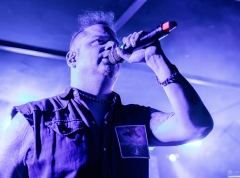

 Twitter
Twitter Facebook
Facebook